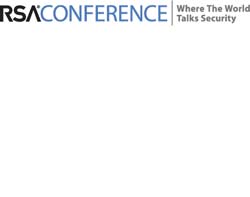Big data and intelligence-driven security are to be the focus of the RSA Conference Europe 2012 in London next month.
Three of the keynote sessions are related to these topics and they are represented in just about every time slot of the track sessions at the event at the Hilton London Metropole from 9 to 11 October.

"This year has seen a sharp spike in the submissions on data mining,data intelligence,extracting information from internal logs and understanding the risks associated with social media,"said Hugh Thompson,RSA Conference programme committee chair.
RSA executive chairman Art Coviello is to look at intelligence-driven security as the new model for the industry and how analytics can help improve security,in the opening keynote.
"If you think about RSA and the transformation they have had since their attack in March 2011,they are very sensitive to understanding the needs inside the company and being proactively aware,"Thompson told Computer Weekly."This is about getting smarter about what we do by crunching the data we have access to,"he said.
This year the conference is moving from the broader concepts to more specifics on how information security professionals can use data and analytics to optimise spending and improve security,with sessions geared towards practical implementation,he said.
Supporting that theme,is the keynote on the art of cyber war by Francis de Souza,group president of enterprise products and services at Symantec that looks at whether information security professionals can be better at what they do by measuring themselves more effectively.
Continuing the theme,the keynote by Philippe Courtot,chief executive of Qualys,examines whether big data is a threat or an opportunity for security,while Joshua Corman,director of intelligence at Akamai Technologies is to look at how the security industry knows whether it is making an impact.
"There is a lot of existentialism in this year's keynote agenda because we are getting at the very fabric of security in society.It has moved from just defending against malware to a public policy issue.It is a world-level discussion topic now which it was not two to three years ago,"said Thompson.
Mobility
Mobility is probably the second biggest theme in this year's conference,with a dedicated session track and very specific topics such as Android malware and creating a policy on bring your own device(BYOD),he said,as the topic follows the same lifecycle of maturity as security in cloud computing and other big topics like data leakage prevention,moving from the general to the specific.
"From a European point of view,the same is happening around privacy,with lots of sessions in the general agenda devoted to privacy-related issues,particularly dealing with the rapidly-evolving European privacy environment,"said Thompson.
Cloud security is featured in the keynote agenda with a session on the risks and rewards of cloud computing by Adrienne Hall,general manager of the Trustworthy Computing group at Microsoft,while Thompson himself is to examine the human behaviour aspect of information security,which he has been teaching and researching at Columbia University for the past four years.
There is a lot of existentialism in this year's keynote agenda--Hugh Thompson,RSA Conference programme committee chair
"This is a compelling topic because the root of most advanced cyber attacks is often not a piece of ninja malware,but a person inside the organisation who has made an unfortunate choice,"he said.
For far too long the security industry has failed to focus enough on this,said Thompson,and attackers are taking advantage of that.
In the closing keynote,Wikipedia founder Jimmy Wales–who has been critical of UK government plans to make it easier for security and police services to spy on electronic communications–is to look at democracy and the internet.
This is one of three keynotes that will be looking at the tensions between security,freedom and society,which are coming to a head in the US and Europe as key policy decisions are being made,said Thompson.
The other related keynotes will be by author and journalist Misha Glenny,who is to examine the struggle for control of the internet,and BT chief security technology officer Bruce Schneier,who is to look at trust,security and society.
"This comes down to the basic questions of when do we trust,when do we not trust,and what do we do if we are suspicious,"said Thompson.
Author studios
New to the conference this year is a breaking research track that is aimed at giving organisers the flexibility to bring in some of the innovative things going on in security and up-to-the-minute sessions that look at the big issues that people are talking about in the run up to the conference.
Another innovation this year,are the author studio sessions by people who have written security-related books,including Parmy Olson,author of We Are Anonymous,Bruce Schneier,author of Liars and Outliers and Misha Glenny,author of DarkMarket:How Hackers Became the New Mafia.
Progress has also been made in bringing the European conference more in line with the US conference in terms of government involvement,which includes a lunch session on 9 October,in which the Cabinet Office's Government Digital Service will discuss the development of a pan-government model for identity assurance.
Apart from a bigger government involvement than in the past,Thompson said there is also greater alignment this year at the European conference with industry standards groups and organisations like the European Union cyber security agency Enisa.
"They have made some fascinating progress with things like auditioning the cloud and ways to benchmark cloud computing service providers,"he said.





